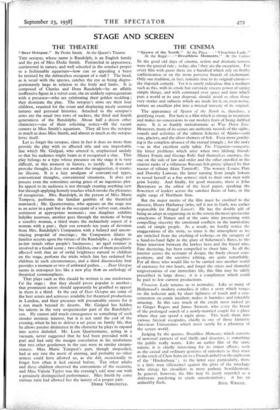THE CINEMA
" Spawn of the North." At the Plaza--" Vivacious Lady." At the Regal—" Breathless Moments." At the Cameo
IN the good old days of cinema, action and dramatic tension were the general rule ; today, alas I they are the exception. For every film with gusto there are a hundred which rely on frothy sophistication or on the more perverse brands of excitement. Only one tradition, in fact, remains true to its original canons— the slapstick comedy. Yet it is surely ridiculous that a medium such as this, with its crude but curiously sincere power of saying simple things, and with command over space and time which puts a world at its easy disposal, should avoid so often those very stories and subjects which are made for it, or, even worse, torture an excellent plot into a twisted travesty of its original.
The appearance of Spawn of the North is, therefore, a gratifying event. For here is a film which is strong in treatment and makes no concessions to our modern fears of being dubbed naive. It is as frankly melodramatic as Way Down East. Moreover, many of its scenes are authentic records of the sights, sounds and activities of the salmon fisheries of Alaska—cold seas, glaciers, and the silver showers of fish. Even more gratify- ing is the complete absence of the eternal triangle ; for the story —as in that excellent early talkie The Virginian—concerns the bitter problems which arise when two lifelong friends (Henry Fonda and George Raft) find themselves enemies, the one on the side of law and order and the other enrolled in the sinister ranks of a villainous Russian fish-pirate (played by that master of villainy Akim Tamiroff). The women (Louise Platt and Dorothy Lamour, the latter turning from jungle hokum to reveal herself as a fine actress) stick to their own men with grim loyalty. And finally, for good measure, there is John Barrymore as the editor of the local paper, speaking the floweriest of leaders across the sawdust floors of bars, or the night surge of Northern Seas.
But the major merits of the film must be credited to the director, Henry Hathaway (who, tell it not in Gath, was earlier responsible for Bengal Lancer). He has the double gift of being an adept at organising on to the screen the most spectacular cataclysms of Nature and at the same time presenting with compelling sincerity the emotional conflicts in the inarticulate souls of simple people. As a result, we hardly notice the exaggerations of the story, so tense is the atmosphere as we are switched from the crashing of icebergs, or the savagery of a hand-to-hand fight in the glare of fishermen's flares, to the bitter interview between the lawless hero and the friend who, Fate decreeing, has been compelled to shoot him. In all the interior scenes the restraint of design, the finely chosen com- positions, and the sensitive editing, are quite remarkable. For all those who would like to be carried into another world of existence for two hours, and forget the crises and shameful tergiversations of our immediate life, this film may be safely prescribed in large doses; it is a compliment which could be paid to few current productions.
Vivacious Lady returns us to normalcy. Like so many of Hollywood's modern comedies, it takes a story which verges on the indecent and, by sheer lightness of touch and a con- centration on comic incident, makes it harmless and tolerably amusing. In this case much of the credit must indeed go to Ginger Rogers and James Stewart, who crrry the brunt Of the prolonged search of a newly-married couple for a place where they can spend a night alone. This leads them into various farcical escapades, chiefly in one of those fantastic American Universities which must surely be a phantasy of the screen world.
Judging by the queues, Breathless Moments, which consists of newsreel extracts of real thrills and disasters, is something the public really wants. Like an earlier film of the samo nature, it is chiefly interesting for its minor effects, such as the casual and ordinary gestures of onlookers as they react to the crash of Clem Sohn on to a French airfield or the explosion of the ' Hindenburg ' ; in the latter case particularly, there is a little man silhouetted against the glare of the wreckage who shrugs his shoulders in most pathetic bewilderment. In general, however, the film may be justly regarded as a deliberate pandering to crude sensationalism ; it has an






































 Previous page
Previous page